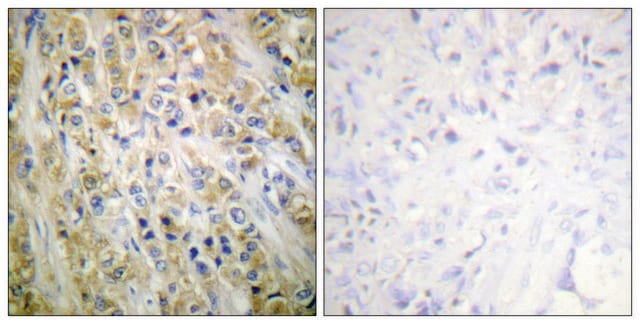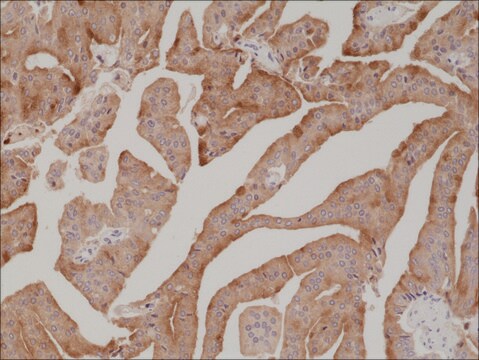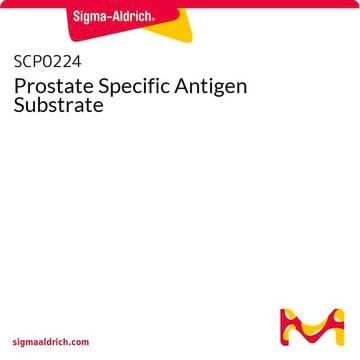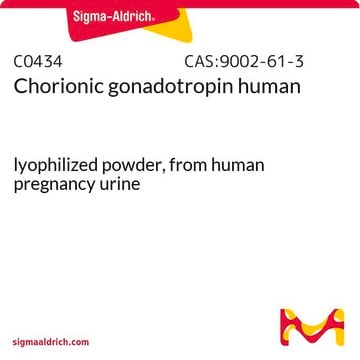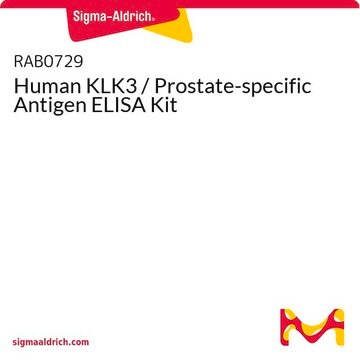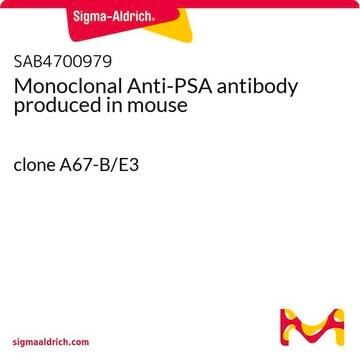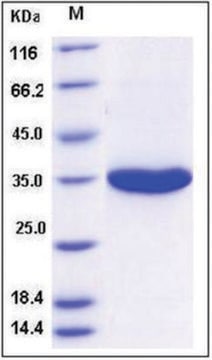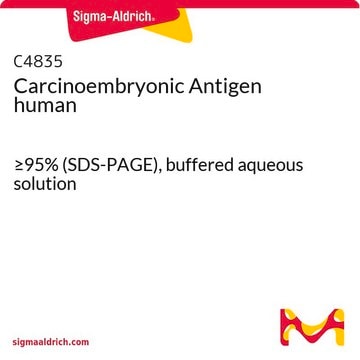P3338
Prostate Specific Antigen from human semen
buffered aqueous solution
Synonyme(s) :
Cancer-associated PSA, PSA
Se connecterpour consulter vos tarifs contractuels et ceux de votre entreprise/organisme
About This Item
Produits recommandés
Niveau de qualité
Numéro d'accès UniProt
Température de stockage
2-8°C
Informations sur le gène
human ... KLK3(354)
Vous recherchez des produits similaires ? Visite Guide de comparaison des produits
Description générale
Prostate specific antigen (PSA) is a 28.43 kDa single-chain glycoprotein containing 237 amino acids, encoded by the kallikrein gene mapped to human chromosome 19. It is specifically expressed by human prostate tissue and is one of the highly abundant proteolytic enzyme expressed in the seminal fluid.
Application
Prostate Specific Antigen from human semen has been used:
- in microarray sandwich assay
- in the preparation of sandwich immunosensor
- as a target protein to test composite organic−inorganic nanoparticle (COIN) and Alexa conjugates in a plate-binding assay
Actions biochimiques/physiologiques
Prostate Specific Antigen (PSA), a glycoprotein of the glandular kallikrein family, is a serine protease with chymotrypsin-like enzymatic activity. Circulating PSA exists in free and protease inhibitor-bound forms. Studying the ratios of free to inhibitor-bound forms may prove valuable in the diagnosis of prostate cancer.
Prostate-specific antigen (PSA) is an androgen-regulated serine protease specifically produced by prostatic tissue and is secreted into the lumen. PSA in semen cleaves semenogelins present in the seminal coagulum. Total PSA levels are increased in serum of prostate cancer (PCa) patients. PSA functions as a potential biomarker for PCa. Serum protease inhibitors such as α1-antichymotrypsin (α1-ACT), α2-macroglobulin (α2-M), and other acute-phase proteins form irreversible complexes with circulating PSA and hinder proteolytic activity of PSA.
Conditionnement
Package size based on protein content
Qualité
Highly purified
Forme physique
Solution in phosphate buffered saline, contains 0.05-0.1% sodium azide with 50% glycerol
Code de la classe de stockage
12 - Non Combustible Liquids
Classe de danger pour l'eau (WGK)
WGK 2
Point d'éclair (°F)
Not applicable
Point d'éclair (°C)
Not applicable
Certificats d'analyse (COA)
Recherchez un Certificats d'analyse (COA) en saisissant le numéro de lot du produit. Les numéros de lot figurent sur l'étiquette du produit après les mots "Lot" ou "Batch".
Déjà en possession de ce produit ?
Retrouvez la documentation relative aux produits que vous avez récemment achetés dans la Bibliothèque de documents.
Les clients ont également consulté
Chun-Jen Hsiao et al.
Disease markers, 2016, 8915809-8915809 (2016-04-12)
Glycans of prostate-specific antigen (PSA) in prostate cancer were found to be different from that in benign disease. It is difficult to analyze heterogeneous PSA glycoforms in each individual specimen because of low protein abundance and the limitation of detection
Pt nanoparticle label-mediated deposition of Pt catalyst for ultrasensitive electrochemical immunosensors
Zhang J, et al.
Biosensors And Bioelectronics, 26(2), 418-423 (2010)
Microarray-based multiplexed scanometric immunoassay for protein cancer markers using gold nanoparticle probes.
Kim D
Analytical Chemistry, 81(21), 183-187 (2009)
Barry Lutz et al.
The journal of histochemistry and cytochemistry : official journal of the Histochemistry Society, 56(4), 371-379 (2007-12-12)
Surface-enhanced Raman scattering (SERS) nanoparticles are emerging as a new approach for optical detection of biomolecules. In a model assay in formalin-fixed paraffin-embedded (FFPE) prostate tissue sections, we detect prostate-specific antigen (PSA) using antibody (Ab) conjugated to composite organic-inorganic nanoparticles
Raman nanoparticle probes for antibody-based protein detection in tissues
Lutz B, et al.
The journal of histochemistry and cytochemistry : official journal of the Histochemistry Society, 56(4), 371-379 (2008)
Notre équipe de scientifiques dispose d'une expérience dans tous les secteurs de la recherche, notamment en sciences de la vie, science des matériaux, synthèse chimique, chromatographie, analyse et dans de nombreux autres domaines..
Contacter notre Service technique
